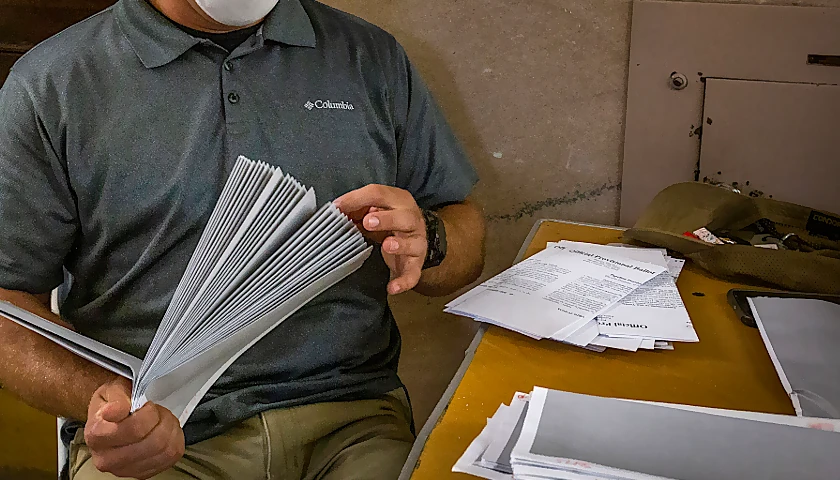NASHVILLE, Tennessee – A bill that would allow Tennessee voters the ability to register with either of the two major political parties or as unaffiliated failed in the House Local Committee.
The effort, sponsored by Representative Tim Rudd (R-Murfreesboro) as HB 1398, was amended to eliminate requiring a party affiliation and eliminate closing the party primaries, as it was felt “having closed primaries would disenfranchise Independents and Democrats and Republicans who wanted to vote in each others’ primary,” according to Rudd as he presented the bill.
A measure to actually close the primaries sponsored by Representative Andy Holt (R-Dresden) under HB 1273, in accordance with a December 2018 overwhelming vote by the State Executive Committee of the Tennessee Republican Party, failed in the same Committee late last month as The Tennessee Star reported.
Representative Rudd made the point that, “The one group of people that are disenfranchised right now, both Democrat and Republican, are party members and activists that actually want to be registered.”
Representative London Lamar (D-Memphis) questioned Representative Rudd, as she did with Representative Holt on his closed primary bill, as to whether he had consulted with both political parties in writing the bill. Rudd responded that he didn’t actually consult with either party.
Representative Lamar then asked why Representative Rudd thinks such a bill needs to be pushed when voters “already have the opportunity to choose a political party when they walk into vote and their voting record is shown in their voter files so you’ll know who’s essentially,” making air finger quotes, “loyal Democrats and loyal Republicans.”
“Most states register to and have closed primaries,” replied Representative Rudd, and continued that for the 30 years he has been involved, he and the (Republican) party, as did the Democrat party at one time, worked to close the primaries or at least be able to register to vote.
He clarified that, “Nobody in Tennessee registers to vote. Each party or each candidate evaluates whether you’re a strong partisan or not by your voting record.”
Reiterating that the bill is permissive and does not require party registration and that cross over voting would not be prohibited, Representative Rudd explained further, “This would just allow people who are proud of their party and want to be a registered voter to go ahead and register, but it doesn’t require it and it doesn’t prevent, if you choose not to be affiliated to vote in either primary. And, for those who consider themselves Democrat or Republican under this bill, you can still cross over as you do under current law. That wouldn’t change. “
After expressing appreciation for the explanation, Representative Lamar gave a similar argument to what she gave to Representative Holt about the closed primary bill, “I would say we should be very wary about this bill because now, the new rising generation of young voters more so identify with issues than political parties, which in my opinion would dissuade them from being able to go to the polls.”
She added, “I reached out to the Tennessee Democratic party and their chair talked about how this would, in fact, get in people’s constitutional rights to vote by dissuading them if they feel like they should choose, even though I know your amendment says ‘may.’ But, if they feel like they are obligated to choose a political party, they don’t want to be involved.”
Representative Lamar said further, “According to the Pew Research Center, 39 percent of voters now identify themselves as independent rather than affiliated with the two major political parties,” saying that she thinks this is “just unnecessary legislation.”
Representative Lamar expressed her belief that the bill, “would also require candidates to dissuade them from reaching out to everybody.”
Referring to the use of the terminology “RINO” and “DINO” for Republican In Name Only and Democrat In Name Only, Representative Jeremy Faison (R-Cosby), said he felt this is an additional litmus test for the “hard-core liberal or hard-core right wing” to decide whether “you’re truly a Republican or truly a Democrat.”
He rhetorically asked the question if next year, when a candidate is running for office, if they will be asked if they are registered. Representative Faison continued that a candidate has to be a bona fide Republican to be on the ballot and that he has “watched the Democrat party kick people right off the state of Tennessee ballot, because they weren’t Democrat enough for them.”
Representative Lamar agreed with Faison, saying, “I just want to second Representative Faison’s point about the litmus test.”
“I think he’s exactly right and we also must remind it that this will again dissuade voters from turning out to vote when we are 49th in the country in voter turnout. So, we need to make sure we give every effort to make the voting process more inclusive, so that we can altogether get more citizens to turn out to the polls and I think this would dissuade them.”
The majority of states at 31, plus the District of Columbia, have party registration according to the University of Virginia Center for Politics. With 48 states having better voter turnout than Tennessee, and 31 states having party registration, there appears to be no correlation to party registration and voter turnout.
Before the Committee proceeded to vote, Representative Gloria Johnson (D-Knoxville) stated that email she received, mostly from independents, asked her to vote against the bill. She added that East Tennesseans are independent-minded and pragmatic and that, “I don’t think that this bill is going to further or better (the) situation in our democracy.”
By voice vote, Chairman John Crawford (R-Kingsport), who voted No himself, ruled that the Nos prevailed.
The bill passed by voice vote in the five-member House Elections & Campaign Finance Subcommittee the week prior, with Crawford (R-Kingsport) being the only member requesting to be recorded as voting No.
Meanwhile, a bill that authorizes a person who registers to vote by mail to also cast their first vote by absentee ballot was passed by the same Committee.
Current law requires that if a voter registers by mail, the first time voting after registering must be in person.
Under HB 0965 sponsored by Representative Harold Love (D-Nashville), the voter who never presented themselves in person to register, would now be allowed to mail in an absentee ballot by providing a photocopy of their Tennessee or federally issued photo identification along with the absentee ballot.
– – –
Laura Baigert is a senior reporter at The Tennessee Star.
Photo Tim Rudd (Right) by Tim Rudd. Photo Andy Holt (Left) by Andy Holt. Background Photo “Tennessee House Floor” by Ichabod. CC BY-SA 3.0.






Since we are tinkering with elections, when I go to vote, I want to see parties other than Democrat and Republican listed on my ballot
I have never heard such convoluted reasoning from a bunch of politicians. What on earth are they afraid of? Could it possibly be because the voters vote as a “red” state and the government rules like a “blue” state? I am sick and tired of this stonewalling.
Conservatives have to be ready to support the most promising primary challenges against Reps Calfee, Carr, Crawford, Faison, Helton, Moon, Ramsey, Tillis, Travis and Wright who voted against closing Republican primaries. We needn’t beat all of them. Initially just the threat of facing a serious primary challenge as a reward for their being centrist establishment toady should be enough.